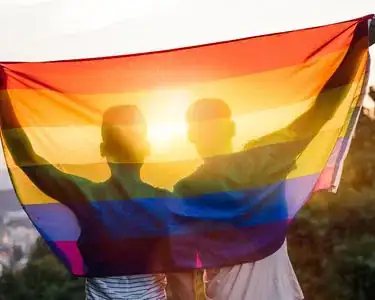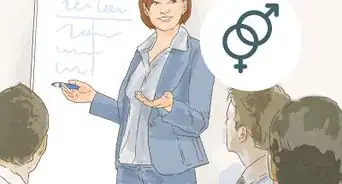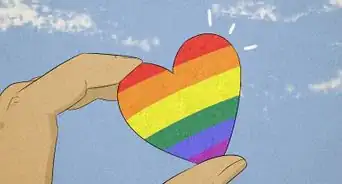Am I Straight?
Sexuality. It’s complex, personal, and ever-evolving. So, how do you know if you’re straight, gay, or something in between?
We know questioning your sexuality can be tough, so we’ve put together this quiz to help. Simply answer these questions about your most intimate fantasies, crushes, and relationships to learn if you’re heterosexual or fit into the LGBTQ+ spectrum.

Questions Overview
- The opposite sex, but I thought all celebrities were hot.
- The cutest celebrity of the opposite sex.
- I don’t know. I idolized lots of people.
- The hottest cartoon character of the same sex.
- Wave and strike up a conversation. I’m open to new things.
- Smile but let them know I’m not into them that way.
- Blush. Should I talk to them?
- Flirt back—I’m single and ready to mingle!
- Nope, but I wouldn’t mind trying.
- No, and I wouldn’t dream of doing it.
- Yeah, and I kind of liked it.
- Of course! What else would I do after a date?
- Not that I know of, but I wouldn’t be opposed to it.
- No. Unless you count platonic feelings.
- Maybe, but I’m not sure.
- Yep! It happens more often than you’d think.
- Consider if I should kiss them to see what it’s like.
- Think about how I’m going to die a virgin.
- Ask them about themselves. Maybe they’d be into me…
- Make out. We might as well enjoy our final moments together.
- I’d maybe kiss them, just to see how it was.
- I’d hug a friend who needs a friend’s support.
- I’d go all the way, maybe.
- I’d hit all the bases and keep coming back for more.
- Indifferent. I wouldn’t be offended, but it’s not my label.
- Odd. I don’t resonate with that label.
- Alright. It’s not how I identify, but they’re not entirely wrong.
- Thrilled. I’m glad they caught on!
- Excited! I’m always down for a good time.
- Alright, but it’s not really my scene.
- Nervous. What if I meet someone I like?
- Hopeful. Maybe I’ll find a new boo.
- Nope, but I wouldn’t be upset if I did.
- Never. My fantasies involve the opposite sex.
- Sometimes. It depends on who I’m falling for.
- All the time! The opposite sex doesn’t appeal to me.
- How sweet! I wonder what that feels like…
- That’s cute, but I don’t give it a second thought.
- Man, I wish that was me.
- I have to call my partner—that should be us on a romantic date!
- Squeal and tell them they must take me to all the gay bars.
- Hug them and let them know I’m an ally.
- Wonder if they can help me learn more about myself.
- Think about saying, “Me too.”
- Probably a partner of the opposite sex, but who knows?
- Someone of the opposite sex, definitely.
- I’m not sure. The image constantly changes.
- Someone of the same sex, for sure.
More Quizzes
ABCs of Sexual Orientation and Gender Identity
What do the letters in LGBTQ+ stand for? These terms don’t have universal definitions since everyone who identifies with a certain label gets to pick what that identity means to them. After all, it’s hard to define a key part of someone’s experience in a single word! But to give you the basics of LGBTQ+ terms, we’ve put together a glossary of common terms you might see or hear.
Asexual (“ace”) - Asexual refers to a lack of interest in sex or sexual contact with other people. People who use this umbrella term might experience a range of sexual attraction, from zero desire for sex, to occasional sexual attraction, or attraction only alongside a strong emotional bond (demisexuality).
Bisexual (“bi”) - The term bisexual refers to attraction to people of the same gender and another gender.
Gay - While this adjective has historically described men who are attracted to other men, the term now is used to refer to anyone who experiences romantic, emotional, or physical attraction to people of the same gender.
Gender identity - Gender identity is an internal feeling of how individuals perceive themselves as male, female, genderqueer, non-binary, etc.
Gender expression - Gender expression is the external way people convey their gender identity through behavior and physical appearance like clothing choices, body characteristics, speech patterns, etc.
Intersex - Intersex people are born with anatomy or sex characteristics that don’t fit into the “male” or “female” binary boxes. They may or may not identify with the sex they are assigned at birth (just like non-intersex people).
Lesbian - Women and non-binary people use this term to identify as people who are emotionally, romantically, or sexually attracted to other women.
Pansexual (“pan”) - Pansexual refers to people who are attracted to any/all genders or who don’t limit their attraction to the confines of the gender binary. Some pansexual folks might say that gender and sex are not determining factors in their attraction.
Non-binary - Non-binary refers to gender identity rather than sexual orientation. People who identify as non-binary express their gender and identity in a way that lives outside of and inherently rejects the socially-constructed gender binary. This term can include people who are genderqueer or gender expansive too.
Queer - This is an umbrella term that includes a variety of gender & sexual identities that fall outside of heteronormativity and the limitations of gender binary systems. While the word queer was once a slur, many people in the LGBTQ+ community have reclaimed the term to be radical and all inclusive.
Questioning - Questioning is both a noun and a verb. It describes periods of personal reflection and exploration involved in the process of discovering sexuality, gender identity, and gender expression. Additionally, it can be the second Q to queer in LGBTQQ, to denote the inclusion of folks questioning their identities.
Sexual orientation - Sexual orientation describes a person’s inherent physical, emotional, or romantic attraction towards other people, often based on their gender identity and/or expression. It is often used interchangeably with attraction and sexual identity.
Transgender (“trans” or “trans*”) - Transgender is an umbrella term that includes people whose gender identity and/or gender expression transgress the boundaries of gender and can differ from the sex they were assigned at birth. Since gender identity and sexual orientation are separate, transgender people can identify as straight, gay, lesbian, bisexual, etc. The spelling trans* is sometimes used to include all gender-queer or expansive identities.
Want to learn more?
For more information about sexuality and the LGBTQ+ community, check out these resources:

















